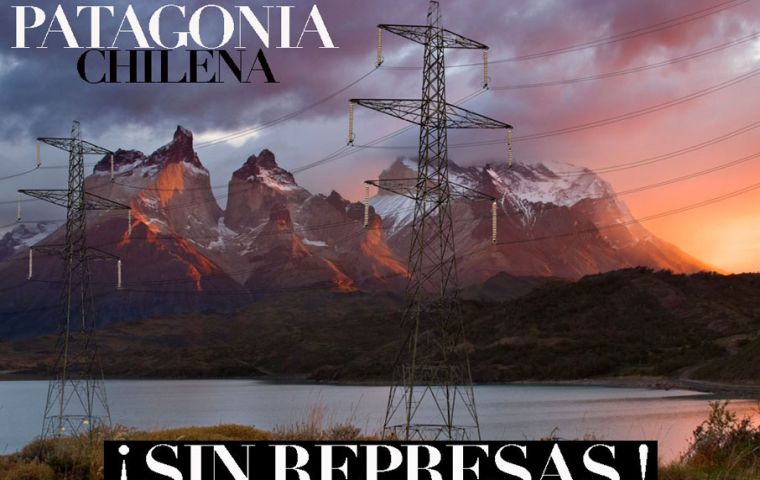MercoPress. South Atlantic News Agency
Environmentalists march to protest building of dams in Patagonian Chile
 Huge dams are ‘out’ seems to be public opinion feeling
Huge dams are ‘out’ seems to be public opinion feeling In honour of June 5, World Environment Day, activist groups and artists will march this weekend to protest efforts by electric companies to build hydroelectric plants in southern Chile.
The NGO Patagonia Sin Represas will headline the Santiago event, which hopes to bring broader awareness to the issue. The groups will meet Saturday morning at 11:30 and march downtown Santiago where organizers will host live shows and information sessions.
The giant hydroelectric dam project known as HidroAysén was announced in 2006 for southern Chile’s Aysén Region XI. Its promoters are two of the largest electric companies in the country, ENDESA Chile and Colbún S.A.
Proponents say that HidroAysén would be an efficient way to grapple with Chile growing energy needs, since natural gas imports from Argentina are regularly cut off just when most needed, in cold weather, and the global prices of oil and other combustibles are unstable. They hope that by 2020, the project would generate enough energy to provide at least 21 percent of the country’s electricity.
Opponents say the project overlooks less environmentally harmful alternatives such as wind, solar, and geothermal energy and making current hydroelectric plants in the central and southern regions more efficient. They also oppose the construction of over 2,200 kilometres of transmission line that would have to pass through national parks and private land in Patagonia and regions north in order to bring HidroAysén electricity to where it’s needed: in Chile’s central valleys and the Metropolitan Region that surrounds Santiago.
“HidroAysén is not necessary for Chile—we´d be lying if we said our future energy needs were dependent on a single project,” said former Minister of the Environment Ana Lya Uriarte. “When these businesses say that Chile will suffer without the projects, they are speaking from personal interest and not from what is in the interest of all Chileans.”
A 2009 study by five post-graduate engineers from the Massachusetts Institute of Technology (MIT) working in the Aysén Region found that the sedimentation produced by some of the dams would lower water levels in glacial lakes and also estimated the total emission of CO2 for their construction and operation of the plants to be roughly four million tons.
The engineers concluded that it is in Chile´s best interests to at least consider alternative sources of energy.
A 2009 study by researchers at the Universidad de Chile, “¿Se Necesitan Represas en la Patagonia?”, argued that Chile’s energy needs were being met and can continue to be met in ways much more simple than proponents of HidroAysén had claimed, and that additional plant construction in Patagonia was not necessary.
A recent governmental evaluation of the project’s importance and potential ecological impacts was also conducted but is criticized by dam opponents for skewing the results in favor of HidroAysén.
One of the companies with a stake in the projects, Enersis, donated US$10 million to President Sebastián Piñera’s administration for “Levantemos Chile,” the rebuilding effort following the Feb. 27 earthquake. Critics also noted that the current Minister of the Environment, María Ignacia Benítez—who guided the study—had previously worked on HidroAysén projects in her work at ENDESA.
The president of the NGO Ecosystems and the international coordinator of Patagonia Sin Represas, Juan Pablo Orrego, says he hopes the event on Saturday will tell Chileans that HidroAysén is ”completely unnecessary. The motives for the projects are rooted in personal gain, and would further concentrate Chile’s energy industry in a few hands. What we need are renewable alternatives that would lead to the decentralization of the country’s energy production.”
He said further that Saturday’s events will “bring together the many organizations with pro-environment interests. It will be larger than in past years, which I attribute to the severity of problems facing our planet today.”
In addition to the Santiago rally, similar events will also be held in Talca, Concepción, Temuco and Coyhaique.
By Aaron Cantu – Santiago Times




Top Comments
Disclaimer & comment rulesCommenting for this story is now closed.
If you have a Facebook account, become a fan and comment on our Facebook Page!